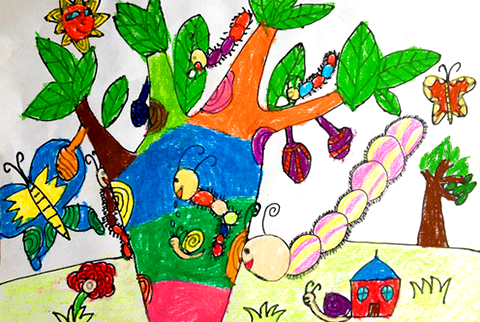![HSK 3 quiz]()
In China, Buddhism has undergone thousands of years of development. Some Buddhist stories have even appeared as modern Chinese versions to relate to current events and culture. These new stories are interesting and have morals with contemporary applications such as wise business policies. Read this story to learn about Buddha’s skill called “talent science.”
Mí Lèfó hé Wéi Tuó de gùshì děi cóng miàotáng de rénshì ānpái shuō qǐ,
弥勒佛和韦陀的故事得从庙堂的人事安排说起,
The story of Mi Lefo and Wei Tuo begins with the personnel arrangements of the temple,
Xiāngchuán hěn jiǔ yǐqián, tāmen bìng bú zài tóng yí zuò miàotáng lǐ jiùzhí,
相传很久以前,他们并不在同一座庙堂里就职,
According to the legend, a long time ago, they did not have an office in the same temple,
Érshì gèzì fēnbié zhǎngguǎn zhe bùtóng de miàoyǔ.
而是各自分别掌管着不同的庙宇。
while they’re respectively in charge of different temples.
Mí Lèfó lèguān kāilǎng, hěn yǒu qīnhélì,
弥勒佛乐观开朗,很有亲和力,
Mi Lefo is optimistic, cheerful, and very courteous,
Suǒyǐ lái miào lǐ de rén fēicháng duō.
所以来庙里的人非常多。
So there are so many people coming to the temple.
Dàn tā què diū sān là sì, yě bú shàncháng guǎnlǐ zhàngwù,
但他却丢三落四,也不擅长管理账务,
But he’s forgetful, and he’s not good at managing accounts,
Suīrán miào lǐ de shōurù hái búcuò, dànshì yīrán rùbùfūchū,
虽然庙里的收入还不错,但是依然入不敷出,
Although the income of the temple was pretty good, they lived beyond their means,
Tā wánquán bù qīngchǔ yínzi dàodǐ huā zài nǎ gè dìfang le.
他完全不清楚银子到底花在哪个地方了。
He had no idea exactly where the money had been spent.
Ér Wéi Tuó ne, suīrán yánjǐn xìzhì,
而韦陀呢,虽然严谨细致,
As for Wei Tuo, though he is rigorous and meticulous,
Shì lǐcái de yì bǎ hǎo shǒu,
是理财的一把好手,
As well as a good master in financial management,
Dàn chéngtiān yīnchén zhe liǎn, tài guò yánsù,
但成天阴沉着脸,太过严肃,
He has a very serious and sullen face all day,
Hǎoxiàng shuí qiàn le tā qián shì de, nòng de dàjiā dōu hàipà tā,
好像谁欠了他钱似的,弄得大家都害怕他,
As if someone owed him money, which made everyone afraid of him,
Yīncǐ yuànyì lái miào lǐ de rén yuè lái yuè shǎo,
因此愿意来庙里的人越来越少,
As a result, fewer people would be willing to come to the temple gate,
Dào hòulái tā chàdiǎn jiù xiàgǎng shīyè le,
到后来他差点就下岗失业了,
And later on, he was almost laid off and unemployed.
Learn Popular Chinese Words on “金融危机 (JīnRóng WēiJī) Financial Crisis
Què háishì bù zhīdào wèishénme huì zhèyàng.
却还是不知道为什么会这样。
But still, he doesn’t know why that’s the case.
Fó Zǔ jíshí fāxiàn le zhè liǎng zuò miàotáng lǐ de xiànxiàng,
佛祖及时发现了这两座庙堂里的现象,
Buddha found the phenomenon in the two temples.
Jīngguò yìfān kǎolǜ hòu, jiù jiāng tā liǎ ānpái zài tóng yí zuò miào lǐ,
经过一番考虑后,就将他俩安排在同一座庙里,
After some consideration, they were placed in the same temple,
Mí Lèfó fùzé yíng kè, yúshì xìntú yuè lái yuè duō,
弥勒佛负责迎客,于是信徒越来越多,
Mi Lefo is responsible for welcoming visitors, so there are more and more followers,
Ér Wéi Tuó fùzé cáiwù, bìmiǎn le húluàn huāxiāo hé fǔbài xiànxiàng de fāshēng.
而韦陀负责财务,避免了胡乱花销和腐败现象的发生。
And Wei Tuo is responsible for finance, avoiding indiscriminate spending and corruption.
Jīngguò Mí Lèfó hé Wéi Tuó de fēngōng hézuò hòu,
经过弥勒佛和韦陀的分工合作后,
After working in cooperation with a due division of labor between Mi Lefo and Wei Tuo,
Sìmiào lǐ chéngxiàn chū yípài xīnxīnxiàngróng de jǐngxiàng.
寺庙里呈现出一派欣欣向荣的景象。
There was a thriving scene in the temple.
The story of Mi Lefo and Wei Tuo sounds like a modern version of the fairy tale, and the plot is quite simple. But if you ponder carefully, you will realize that this seemingly simple fairy tale is actually interesting and vivid which implies profound “talent science.”
People can’t help but admire the Buddha who knows how to rationally allocate talent resources. Buddha does well in employment, neither blame nor laissez-faire, but to promote their virtues, and to avoid their shortcomings, which reinforce complementary advantages and upgrades the level of practical cooperation. It not only makes the best use of their talents but it also achieves good cooperation, making it a win-win situation.
Key Learning Points:
1.乐观 (Lèguān) optimistic; hopeful;
Chinese Daily Words 乐观 (Lèguān) Optimistic (Advanced)
Example:
Tā zǒngshì bǎochí zhe lèguān de tàidù.
他总是保持着乐观的态度。
He always keeps an optimistic attitude.
2. 开朗 (Kāilǎng) optimistic; hopeful
Example:
Tā shì yígè huópō kāilǎng de rén.
他是一个活泼开朗的人。
He is a lively and cheerful man.
3. 严肃 (Yánsù) serious sober; earnest; grave
Example:
Qǐng yánsù rènzhēn de duìdài nǐ de gōngzuò.
请严肃认真地对待你的工作。
Please take your work seriously.
![HSK 3 quiz]()
1. Read the story and choose the best option to answer the question below.
What does the story tell us?
A. 我们要保持乐观的态度。
B. 我们要严谨地对待工作。
C. 我们要充分发挥各自的长处,才能更好地实现合作共赢。
See Answer Analysis













































